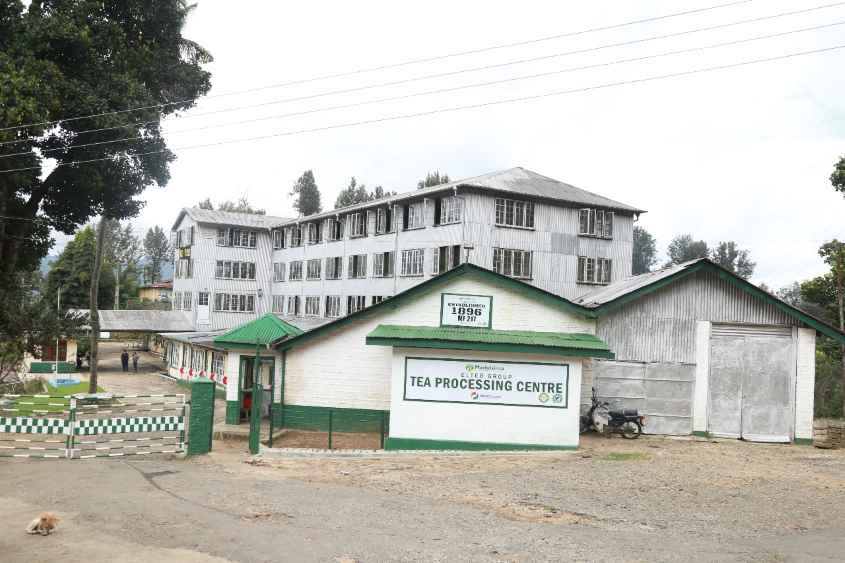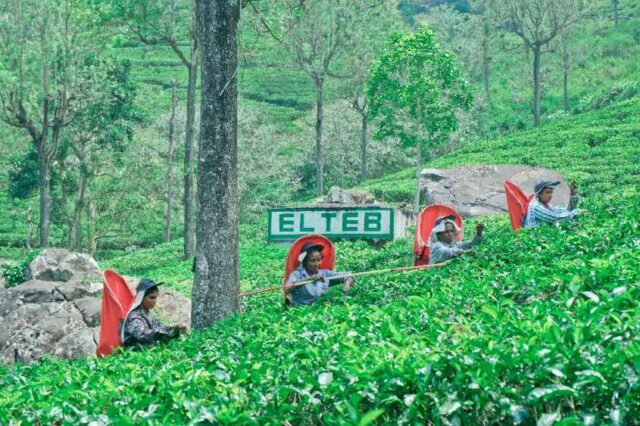
Nestled in the hills of Sri Lanka’s picturesque Uva Province, El Teb Estate is a living testament to the rich history, relentless innovation and deep-rooted community values that define the island’s tea industry. With a heritage spanning over a century, El Teb Estate embodies the spirit of resilience and excellence, producing some of the finest teas sought after by tea connoisseurs all over the world.
El Teb Estate’s story begins in 1896 with Captain Hamilton Gordon of the Gordon Highlanders, a soldier turned planter who traded his military glory for the lush plantations of Uva. His first encounter with the island came as aide-de-camp to Governor Sir Arthur Gordon (later Lord Stanmore), where he was deeply enchanted by Sri Lanka’s natural beauty. Through George Steuart & Co., he was introduced to Mr. J.J. Robinson, who guided him to Heathstock, a humble cardamom estate nestled along the Madulsima road four miles from Passara. Captivated by its potential, Captain Gordon, fondly known as “El Teb Gordon”, acquired the property and renamed it “El Teb” as homage to his military past at the Battle of El Teb in Sudan (1884), where he had served with distinction.
Evolution of a Landmark Estate
Over the years, his vision transformed El Teb into a thriving estate, consolidating nearby lands like Deyanawatte and Galbokke, while keeping Heathstock as the nucleus. Some of these acquisitions came about in colourful ways—legend has it that Gordon bought Deyanawatte from a traveler at the Badulla Club for £50 without the seller even knowing where the estate was located.
Other significant additions included Devenick, an abandoned coffee estate, and portions of St. Mary’s and Kitulkellie. His knack for recognizing opportunity led to the estate’s rapid expansion, including ventures into tea, coffee, and rubber cultivation. Gordon’s innovative spirit, from introducing labor-friendly practices such as serving hot tea during morning muster, to experimenting with crop diversification, reinforced his reputation as a pioneering planter.

Throughout the 20th century there were many changes in ownership and management that brought modern agricultural techniques to El Teb. In 1907, El Teb was sold to the Consolidated Estates Company, with George Steuart & Co. acting as agents. Over the years, several superintendents oversaw the estate’s operations, including Captain Gordon, Mr. P. Phillips, and later Mr. A.M. Clarke, who modernized the estate through expansions into tea and rubber. The lineage of superintendents at El Teb Estate (1896 – Present) spans from its founding leader, Captain H. Gordon (1896–1907), to the current superintendent, C.A. Jayaratne (2024–Present).
After Sri Lanka’s 1975 land reforms, portions of the estate were nationalized and placed under the management of the Janatha Estates Development Board (JEDB). In 1992, following the government’s privatization efforts, management shifted to Madulsima Plantations Ltd. under the Stassen Group, marking the beginning of a new era for the estate
Tea Craftsmanship: A Tradition of Excellence
Every cup of El Teb tea is crafted with care and passion, grown 945 meters above sea level. Over the years, El Teb Estate has achieved several remarkable milestones, achieving a record production of 786,357 kilograms made tea in 1998 and a record yield per Hectare of 2087 in 1996 which established its prominence as a leading tea producer in the Uva region; with smallholder contributions playing a vital role and reaching an unprecedented financial milestone in 2022 with an overall profit of Rs. 110.76 Million.
El Teb follows the Rotorvane method for tea manufacture, ensuring the consistent production of high-quality teas with vibrant flavors and brisk undertones characteristic of Uva teas. The process begins with hand-plucking, where only young, tender leaves are selected, followed by withering to adequately reduce moisture content for rolling and fermentation, enhancing the tea’s aroma and flavor profile. The final stages involve drying and grading, which ensure a long shelf life and optimal market readiness. Renowned for their golden liquor and floral notes, El Teb’s teas are highly sought after, maintaining a consistent presence in international markets. This dedication to quality has earned El Teb top prices in the Uva medium tea category. Reaffirming its reputation for exceptional quality.
In a world that is increasingly focused on sustainability, El Teb has emerged as a leader in eco-friendly practices. The estate’s operations are powered by a Pelton hydro-power plant, harnessing renewable energy from local waterways. Investments in energy-efficient machinery, CCTV surveillance and modern machinery to ensure consistent quality while minimizing environmental impact. From manual weeding to soil conservation techniques, the estate ensures practices that safeguard the environment while enhancing tea yields.
Over the past four decades, Madulsima Plantations has spearheaded the development of 285 hectares of forest, fostering biodiversity while investing over Rs. 44 million in forestry. Beyond tea, the company has diversified its portfolio to include cardamom, cloves, pepper, and rubber, with an investment exceeding Rs. 32 million. These secondary crops not only enhance financial resilience but also highlight Madulsima Plantations’ innovative approach to agriculture. Additionally, the company has invested Rs. 131.4 million in development initiatives, including vehicles, land improvement, water and sanitation projects, equipment, plant and machinery, and buildings. These strategic investments enhance the long-term sustainability of El Teb Estate.
Empowering communities
El Teb Estate is committed to supporting its community, providing stable employment for over 700 individuals while housing a vibrant community of 4,078 residents, including 1,430 children. The estate places a strong emphasis on worker welfare, prioritizing healthcare, education, infrastructure development, and financial security. A fully equipped dispensary, operated in collaboration with the Plantation Human Development Trust (PHDT) and the Ministry of Health, provides regular medical check-ups to ensure the well-being of the workforce. Education is supported through Child Development Centers and initiatives for local schools, nurturing the next generation. Investments in housing, water supply, and sanitation facilities improve living conditions, while the Estate Workers Housing Cooperative Society encourages savings and financial stability, fostering a secure and supportive community environment.
El Teb’s dedication to excellence is further validated by its certifications. The estate follows Rainforest Alliance standards, limiting the use of pesticides and undertakes manual weeding for sustainability. Pruning schedules, low and high shade planting, and soil conservation methods help maintain plant health and protect the land from erosion. The estate’s ISO 22000 accreditations stand as testaments to its high standards in environmental conservation, food safety, and quality management. These certifications position El Teb as a trusted name in international markets, where its teas are celebrated for their distinctive character and exceptional quality. El Teb Estate’s location in the heart of Uva provides it with unparalleled advantages. The region’s unique weather patterns—from the misty rains of September to December to the dry winds of June to August—impart a complex flavor profile to its tea. This combination of fertile soil and ideal climatic conditions ensures that El Teb remains at the forefront of Sri Lanka’s tea industry.
Looking ahead through Innovation and Sustainability
As El Teb strides into the future, it remains committed to blending tradition with innovation. Collaborations with the Sri Lanka Tea Board, Tea Research Institute, and global partners enable the estate to modernize operations and expand its reach. El Teb Estate stands as a symbol of Sri Lanka’s tea heritage—a bridge between the past and the future. From Captain Gordon’s pioneering spirit to the estate’s modern-day achievements, El Teb is a story of resilience, innovation, and dedication. Its journey from a modest plantation to a modern enterprise exemplifies the resilience and vision that define Sri Lanka’s tea industry. As it continues to balance tradition with modernization, El Teb remains committed to setting new benchmarks in quality and sustainability, ensuring a bright future in the global tea market.



